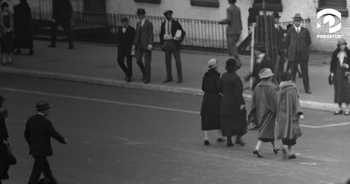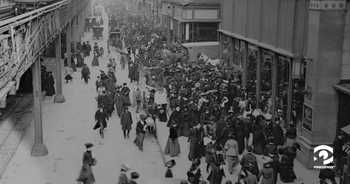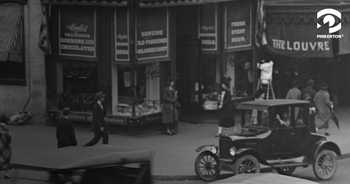Hold onto your shopping carts and a chapter of Pinkerton's department store security history! (We’ve been doing this since the 1870s!) We were once asked, “Why do department stores employ detectives within store premises during business hours?” (It was very formal back then!). We answered, just as formally and quite frankly, “To detect thieves among those entering the store.” “Is thievery in retail stores practiced only by customers or those in the guise of customers?” We replied, “No, it is practiced also by many employees.
And just as quickly, the next question followed, “How do you detect such acts?”
The answer to that was, “We observe.”
Thieves, Pinkerton operatives noted, could be men or women, but women often took the lead, working alone or in small groups. A common tactic involved one person stealing items and quickly passing them to an accomplice who would exit the store, ensuring nothing incriminating was found if the original thief was stopped. These culprits frequently used large handbags, purses, or paper bags to conceal goods, so operatives were trained to watch for such items closely.
Pinkerton's detectives followed strict protocols to ensure effective and fair apprehensions:
- Wait until the suspect has left the store premises before approaching.
- Verify that the stolen property is still in their possession when asking them to return.
- Act only on personal observation of the theft, never relying solely on reports from store staff.
In crowded settings, staying within 5-6 feet was essential to maintain visual contact—close enough to prevent the suspect from slipping away into an elevator, around a corner, or through intervening crowds.
As for identifying dishonest employees, there was an entirely different protocol that could include embedded subject matter experts, in-store detectives, and mystery shoppers. Below, read three short tales detailing how Pinkerton detectives outwitted crime in department stores, turning the tables on retail rogues with our expert retail loss prevention in retail strategies. If you want to read something a little longer about an epic game of cat and mouse through department stores in the early 20th century, check out this blog: The Holiday Swindler and the Detectives | Pinkerton.
Lady Pinkertons: vetted, trained, and shopping
Department stores in the United States burgeoned during the 1920s and 1930s, and so did internal crime. In addition to the Agency’s regular protective work, Pinkerton was frequently called by department stores that showed irregularities, large losses, and inventory shortages. The largest losses were regularly discovered in women’s clothing departments. In these cases, teams of vetted and highly trained Pinkerton detectives — Lady Pinks — were deployed.

In true Pinkerton fashion, their discreet investigations exposed more than shoplifters. They discovered gaps and vulnerabilities in business operations, dishonest employees who padded receipts, and collusive practices at all levels, from managers to buyers, clerks, suppliers, and delivery drivers. In 1929, one team uncovered an embezzlement scheme of more than $4,000, another for $1,800 — about $70,000 and $31,000 respectively in today’s market — and yet another team exposed a shoplifting ring that included 12 clerks all working in different stores across a major U.S. city.
Christmas shopping services

In the mid-19th and early 20th centuries, the United States went through an economic shift that saw an explosion in manufacturing and marked technological developments that not only gave rise to the department store but also afforded more opportunities for crime in department stores: shoplifters, sneak thieves, pickpockets, and swindlers.
Enter Pinkerton’s National Detective Agency, whose fearsome reputation preceded them. Pinkerton’s was instrumental in protecting these growing marketplaces in the bustling big cities, supplying uniformed and plain-clothes operatives as both deterrents to crime and detectives of crime.
As Thanksgiving rolled around, signaling the start of the shopping season, department stores requested additional protective personnel, because store executives saw a marked increase in naughty-list activity—especially in their shipping and receiving departments and warehouses. Pinkerton’s security services were so popular that retailers had to lock in their requests in October for the holiday shopping season.
Surprisingly, stores also requested more operatives for their toy departments, particularly those where Santa Claus visited. Now, we’re not pointing any fingers at the jolly man in red—he’s all about giving and not taking. Let’s just say that there were some not-so-good boys and girls, and Pinkerton was on the job, keeping watch.
The one that almost got away…

And speaking of department stores…William A. Pinkerton, the square-jawed, solidly built son of Pinkerton’s founder Allan Pinkerton and who is often credited with being one of the country’s greatest detectives of his time, said that sometimes things were not as they seemed. When he was interviewed by a newspaper reporter in 1903, he told a story about one of his first detective assignments in the 1870s watching for jewelry thieves and shoplifting prevention at a large Chicago department store.
The reporter described the scene this way: “He [Pinkerton] spotted a well-gowned woman who appeared wealthy and wore furs. Adroitly, she picked up a piece of jewelry and slipped it into her muff. Pinkerton pointed her out to the manager, who replied, ‘Never mind her. She is the wife of a wealthy man, and she cannot help but steal. We keep an account of everything she takes, and he pays the bill monthly.’” New York Commercial, April 13, 1903.
We never sleep.





